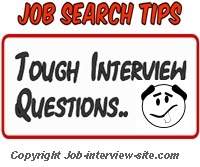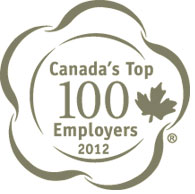
How to Answer 10 Tough Interview Questions
Employers and recruiters are always asking these common tough questions, in addition they will ask you question related to your field or profession. Good practice of these question, good homework and positive attitude will bring successes to you, other things to remember and take with you at interview copies of extra resume, note book, pen, wear proper dress and arrive before 10 to 15 minutes.
There's no worse feeling than when you're in an interview and the interviewer asks you a question to which you don't know the answer. The best way to handle this dreaded debacle is to go into the interview prepared. Familiarize yourself with a few common difficult questions and arm yourself with answers prepared ahead of time.
Other 10 Toughest Interview Questions:
Here are 10 classic tough interview questions you should be ready to answer, along with strategies on how to respond to them in a way that makes you stand out:
1. Could you tell me a little about yourself?
Most interviewers use this question not only to gather information, but also to assess your poise, style of delivery and communication ability. Don't launch into a mini-speech about your childhood, schooling, hobbies, early career and personal likes and dislikes. Instead, briefly cite recent personal and professional work experiences that relate to the position you're seeking and that support your credentials. Better yet, prepare a personal branding statement that quickly describes who you are and what you can bring to the company.
2. Why did you leave your previous employer, or why are you leaving your present job?
The economy has pushed many talented professionals into the workforce, so don't be ashamed to simply explain that you were a part of a downsizing. If you were fired for performance issues, it's best to merely say you "parted ways" and refocus the discussion on how your skill set matches the current position. If you currently have a job, focus on why you're seeking greater opportunity, challenges or responsibility. If you're transitioning to a new industry, discuss why you're making the transition and tie it into the new job responsibilities (make sure that you have very strong references regardless of why you left, or are leaving, a position).
3. What are your greatest strengths?
Briefly summarize your work experience and your strongest qualities and achievements that are directly related to the responsibilities of the job you are applying for. One proven approach is to include four specific skills that employers value highly: self-motivation, initiative, the ability to work in a team and a willingness to work long hours.
4. What are your weaknesses?
Realize that most interviewers don't expect you to be perfect or reveal your true weaknesses. Turn this question around and present a personal weakness as a professional strength. Let's assume that you're detail-oriented, a workaholic and that you neglect friends and family when working on important projects. You can turn these weaknesses around by saying that you're very meticulous and remain involved in projects until you've ironed out all the problems, even if it means working after hours or on the weekend.
Another tactic is to discuss an area where you're seeking improvement, and then highlight the steps you're taking to meet that goal. Perhaps you're an accountant, and are working to improve your knowledge of payroll procedures by taking courses at a local college, or maybe you're an IT professional earning additional certifications.
5. What can you tell me about our company and/or industry?
Do your homework. Check out the company website and their "About Us" section. Most public companies post Investor Information which typically lists their Management Team, Board of Directors and past financial performance. Write down a few key points that you can cite when asked. Interviewers want to know that you're interested in more than just a job.
6.What do/did you like most and least about your present/most recent job?
Concentrate your answer on areas that are relevant to the position and be specific. Don't say, "I liked the atmosphere." Instead, try saying "I enjoyed the camaraderie of being part of a team." When discussing least-liked aspects of your present or previous job, try to mention an area of responsibility that's far removed from the functions of the job you're seeking. But be sure your answer indicates that you either performed the assignment well or that you learned something useful. This shows that you stick with tasks, even ones that don't particularly interest you.
7. Aren't you overqualified for this position?
Hardly anyone expects you to say "yes" to this question in today's job market. If you do, the interviewer may think you'll grow dissatisfied and leave the company quickly. Instead focus on the experience and skill set you'll bring to the position and the value they'll receive by hiring you.
8.What sets you apart from other applicants?
The interviewer who asks you this is really probing your readiness for the job, your ability to handle it, your willingness to work hard and your fitness for the job. Show your readiness by describing how your experience, career progression, qualities and achievements make you an asset. Keep it professional, and focus on the value you'll bring to the position. Highlight your ability by discussing your specific skills and accomplishments, but don't forget to show your interest in the job itself.
9. Where do you hope to be in five years?
This question is often asked of recent college graduates, and the worst answer is to say that you want to be president of the company or have the interviewer's position. Instead, talk about what motivates you especially what will motivate you on this job and what you hope to have accomplished.
10. Do you have any questions? Can you think of anything else you'd like to add?
Don't say "no," or that everything has been thoroughly discussed. If you think the interviewer has any doubts, now's the time to restate why you're the most logical candidate for the opening. Show your interest in the company by preparing some key questions in advance. Asking about corporate culture or what the interviewer likes the best about the company will give you insight and let the interviewers know that you're interviewing them as well.
Having a positive attitude and practicing in advance can help you to field these challenging questions with ease, and that calmness under fire will demonstrate that you can handle crises on the job just as easily.
Remember,
interviewers are looking for a competent, confident candidate who not only wants the job, but also understands its requirements and can quickly hit the ground running. Answering these challenging questions with poise and conviction helps you outshine other applicants, and puts you in a good position to land the job you want.
(source career websites)
hope that helps,
hmisabpk





